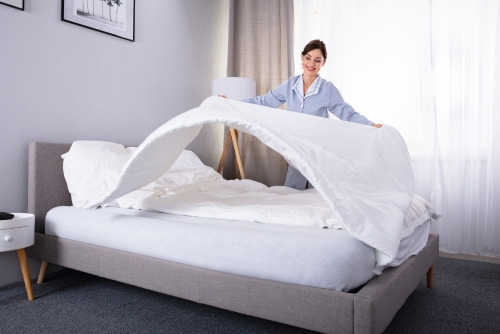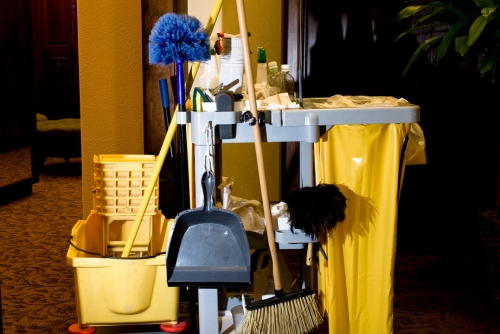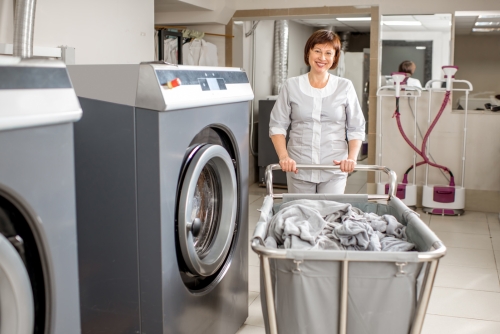
The world of hospitality revolves around a seamless guest experience, and hotel housekeeping plays a pivotal role in achieving that. Housekeepers are the silent heroes behind sparkling guest rooms, ensuring every space reflects comfort, cleanliness, and a touch of luxury. But navigating the world of hotel housekeeping, especially for new staff, can be daunting. Industry jargon and cryptic abbreviations can leave you feeling lost at sea in a sea of cleaning supplies.
Fear not, aspiring hospitality professionals! This comprehensive guide will equip you with the essential knowledge to master hotel housekeeping. We'll delve into 25 key terms and abbreviations used daily by housekeeping teams, transforming you from a newbie to a confident pro.
Unlocking the Lingo: Essential Hotel Housekeeping Terminology
Effective communication is the cornerstone of any successful operation, and hotel room attendant is no exception. Understanding industry-specific terms and abbreviations fosters seamless collaboration within the department and ensures guests receive exceptional service. Let's embark on a journey through the fascinating world of hotel housekeeping lingo!

Room Status Terminology
Imagine a hotel bustling with activity. Guests check-in and out, room attendant staff meticulously clean rooms, and the front desk needs to maintain an accurate picture of room occupancy. This is where room status terminology comes into play.
- Occupied (OCC): This abbreviation simply indicates a room currently has a guest residing in it.
- Vacant (VAC): A vacant room is a clean room with no guests and is ready to be assigned to a new arrival.
- Out of Order (OOO): This signifies a room is unavailable due to maintenance or repairs. Guest services staff might be involved in preparing the room for these tasks.
- Make-up Room (M/U): This term refers to a room that requires cleaning after a guest's stay but doesn't necessitate a full turnover (explained later).
- Clean Stayover (CS): A clean stayover indicates a room where the guest is staying for multiple nights and has opted not to have services that day. However, accommodation services might still replace towels or remove trash upon request.
- Dirty Stayover (DS): In contrast to a clean stayover, a dirty stayover signifies a room where the guest is staying for multiple nights and requires full guest services.
- Do Not Disturb (DND): This universally recognized symbol, often displayed on a guest room door hanger, politely informs staff that the guest wishes for privacy and doesn't require cleaning services at that time. Variations like "Privacy Please" convey the same message.
- Double-Locked (DL): Encountering a double-locked door might indicate a security concern or a guest who accidentally locked themselves out. staff should follow established protocols to handle such situations, often involving contacting security or the front desk.
Room Service Terminology
Beyond maintaining sparkling rooms, hotel housekeeping often plays a supporting role in room service operations. Understanding these terms ensures a smooth flow between departments.
- Turndown Service (TDS): This delightful service involves preparing a guest room for the evening. Guest services staff might adjust lighting, fold down bed covers, replenish towels, and place chocolates or mints on pillows, creating a welcoming ambiance for the guest's return.
- Express Service (EX): In some hotels, express service refers to limited accommodation services offered for short stays or upon guest request. This might involve replacing towels and emptying trash but might not include a full cleaning.
- Incidentals: Room service meals and minibar items fall under the category of incidentals. Staff might be responsible for noting these items used by the guest, which are then added to the final bill.

Housekeeping Equipment & Supplies
A well-equipped housekeeping cart is an extension of a hotel housekeeper's expertise. Let's explore some essential tools of the trade:
- Housekeeping Cart: This mobile workstation carries all the cleaning equipment and tools needed to transform guest rooms. It typically features compartments for cleaning solutions, linens, towels, and waste disposal bins.
- Microfiber Cloths: These versatile cloths are a staple in hotel accommodation services due to their effectiveness in capturing dust, dirt, and allergens without leaving streaks or requiring harsh chemicals.
- Disinfectant: Maintaining a hygienic environment is crucial in hotels. Guest services staff uses disinfectants to sanitize surfaces like countertops, bathroom fixtures, and doorknobs, ensuring guest safety and well-being.

Housekeeping Procedures & Protocols
Efficiency and consistency are hallmarks of exceptional hotel accommodation services. Understanding these procedures ensures a streamlined workflow and delivers a predictable level of cleanliness for guests.
- Turnover (TO): This term refers to the complete cleaning and preparation of a guest room for a new arrival. A thorough turnover involves tasks like:
- Removing all traces of the previous guest's belongings.
- Stripping and remaking beds with fresh linens and crisp pillowcases.
- Cleaning and disinfecting bathrooms, including toilets, sinks, showers, and bathtubs.
- Vacuuming carpets and dusting furniture.
- Replenishing all amenities like toiletries, coffee, and tea supplies.
- Room Inspection: Before a room is declared ready for a new guest, a meticulous inspection is conducted. This ensures all cleaning tasks are completed to a high standard and identifies any areas requiring further attention.
- Lost and Found: Hotels are treasure troves of forgotten items. Staff plays a vital role in managing lost and found. This might involve collecting lost items, logging them, and following established procedures to reunite them with their rightful owners.
- Amenity Replenishment: From fluffy towels to refreshing toiletries, guests expect a well-stocked room. Housekeeping staff ensures these amenities are replenished during turnovers, turndown service, or upon request.

Guest Communication & Requests
Exceptional hotel accommodation services hinge on clear communication with guests. Here are some key terms to remember:
- Guest Request (GR): Guests may have specific requests related to room attendant services. This could range from requesting additional towels to asking for hypoallergenic bedding. Staff should be attentive to these requests and fulfill them promptly.
- Housekeeping Supervisor: The housekeeping supervisor plays a crucial role in managing various departments and ensuring guest requests are addressed efficiently. They might assign tasks, troubleshoot issues, and liaise with the front desk to ensure guest satisfaction.
- Special Requests: Some guests may have special requests, such as needing a crib for a baby or a specific type of pillow. Guest services staff should communicate these requests to the appropriate department to ensure they are met.
Department Management & Operations
A well-oiled housekeeping department is the backbone of a smoothly functioning hotel. Let's delve into some key management terms:
- Housekeeping Department (HK): This refers to the entire team responsible for maintaining the cleanliness and hygiene of guest rooms, public areas, and sometimes even back-of-house spaces.
- Housekeeping Manager: The director of housekeeping is the leader of the department, overseeing hotel staff schedules, training, and ensuring adherence to quality standards.
- Housekeeping Schedule: Creating an efficient room attendant schedule is crucial to maximizing productivity. Factors like room occupancy, room types, and cleaning time per room are considered when creating the schedule.
The Hotelier's Checklist: Mastering Cleaning, Linen, Laundry, Amenities & Rubbish Removal for Seamless Accommodation
In large Canadian hotels, ensuring a seamless guest experience hinges on the coordinated efforts of various departments. The housekeeping department, led by the executive housekeeper and supported by floor supervisors and assistant housekeepers, tackles a wide range of housekeeping duties across all areas of the hotel. From the sparkling guest rooms and well-maintained common areas like the lobby and ground floor to the linen room where fresh towels and sheets are readied, housekeeping staff pay special attention to detail. They utilize specialized equipment like vacuum cleaners and housekeeping trolleys to tackle everything from dust bunnies to water stains, ensuring a hygienic and comfortable environment. The engineering department works closely with housekeeping to address any maintenance issues that might arise, while the laundry staff plays a crucial role in keeping the hotel stocked with clean linens.
Coordination between the housekeeping department, front office (which manages bookings and guest requests), and the uniform room (ensuring staff uniforms are clean and presentable) is vital. Even seemingly minor details, like ensuring fresh air circulation through proper ventilation or replacing a flickering TV in a guest room, can significantly impact a guest's experience. Ultimately, efficient housekeeping services are a real threat to germs and grime, allowing staff to clean rooms in less time and with less workload, freeing them to dedicate special attention to guest comfort and satisfaction.

Exploring the Evolving Landscape of Hotel Housekeeping
In the fast-paced world of large Canadian hotels, maintaining a spotless environment is crucial for both guest satisfaction and staff well-being. Hotel management, led by the general manager, relies heavily on the dedication of housekeeping staff members, including deputy housekeepers, who support the department's overall operations. Effective hotel management software streamlines the cleaning process, ensuring efficient task allocation and minimizing the risk of missed areas.
Housekeeping staff, equipped with mops, cleaning supplies, and well-stocked housekeeping trolleys, tackle everything from dust and rubbish to potential health hazards. Their meticulous cleaning ensures guest rooms are not only visually appealing but also free from hidden threats that could disrupt a guest's experience.
Collaboration with the maintenance department is vital, as they address any underlying issues requiring repairs, like leaky faucets or faulty air conditioning, which can directly impact guest comfort. Ultimately, a hotelier's success in Canada's competitive hotel business hinges on providing exceptional guest experiences. This relies heavily on a well-trained and well-equipped housekeeping team working seamlessly behind the scenes.
The world of hotel housekeeping is constantly evolving. Here, we'll explore some exciting trends and considerations:
Unveiling Housekeeping Mysteries
Ever wondered what it takes to become a hotel housekeeper or the daily tasks they perform? We've got you covered!
- How to Become a Hotel Housekeeper? A high school diploma or equivalent is typically sufficient. However, strong cleaning skills, attention to detail, and excellent communication abilities are highly sought-after qualities. Many hotels offer on-the-job training, and some positions might require specific certifications.
- What Does a Hotel Housekeeper Do in a Day? A typical day for a hotel housekeeper involves cleaning assigned guest rooms, restocking amenities, responding to guest requests, and adhering to established cleaning protocols. The specific tasks might vary depending on the guesthouse size and housekeeping department structure.
- What are the Benefits of Working in Hotel Housekeeping? Hotel housekeeping offers competitive wages, flexible schedules (often appealing to students or parents), and opportunities for career advancement within the hospitality industry.
Additional Considerations for Modern Housekeeping
As technology continues to revolutionize the hospitality industry, hotel housekeeping is embracing these advancements.
- The Role of Technology in Hotel Industry: Housekeeping apps can streamline task management, communication, and room inspection processes. Digital checklists ensure consistency and can even flag urgent guest requests.
- Green Housekeeping Practices in Hotels: Sustainability is a growing concern for guesthouses and guests alike. Green housekeeping practices involve using eco-friendly cleaning products, water conservation techniques, and opting for reusable amenities where possible. These practices not only benefit the environment but can also enhance a hotel's brand image.
Conclusion: Unlocking a Rewarding Housekeeper Career Path
In what ways does housekeeping directly impact guest satisfaction?
Mastering hotel housekeeping terminology empowers you to navigate the exciting world of hospitality. Understanding these terms fosters seamless communication, ensures exceptional guest service, and positions you for success in this dynamic field. The Rewarding World of Hotel Housekeeping
Beyond the technical aspects, hotel room attendant offers a rewarding career path. Here's why:
- Sense of Accomplishment: Transforming a used guest room into a sparkling haven for a new arrival brings a sense of satisfaction and accomplishment.
- Attention to Detail: For those who thrive on meticulousness, hospitality attendant allows you to hone your attention to detail and ensure cleanliness standards are consistently met.
- Varied Work Environment: No two days are the same in hotel guest services. You'll encounter different room configurations, visitor requests, and challenges, keeping your workday dynamic.
- Teamwork and Collaboration: Housekeeping staff work together to ensure a smooth operation. Developing strong teamwork and communication skills is essential, fostering a sense of camaraderie within the department.
- Career Advancement Opportunities: The hospitality industry offers a plethora of career paths. With experience and dedication, housekeepers can progress to supervisory roles, housekeeping management positions, or even explore other departments within the hotel.
- Professional Development Opportunities: "For housekeepers seeking to further their careers, the International Executive Housekeepers Association (IEHA) offers a wealth of professional development opportunities International Executive Housekeepers Association.
Embrace the challenge; Master the Craft
The world of hotel housekeeping is an intricate dance of efficiency, guest satisfaction, and maintaining high standards of cleanliness. By mastering the terminology, understanding the procedures, and embracing the challenges, you can embark on a rewarding career path in the dynamic hospitality industry. So, are you ready to unlock the secrets of a hotel room attendant and become a hospitality pro?

